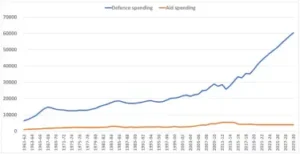Description: Defence Spending Peace Investment
Dive into Australia’s defence spending vs. peace investment debate. How should resources be allocated for lasting peace?
Introduction: Assessing the Impact of Defence Contracts on Peace Efforts
Australia’s recent engagement with Rheinmetall for a $1 billion defence contract stands for a substantial commitment to expanding the nation’s military capabilities. This investment is framed as a strategy to enhance national security and contribute to economic growth by creating approximately 1,000 jobs in manufacturing, engineering, and associated industries.
Proponents argue that such contracts strengthen the domestic defence industry, reduce reliance on foreign suppliers, and stimulate regional economies, particularly in areas where defence-related facilities are set up.
However, this investment raises critical questions about the opportunity costs of prioritizing defence spending over peace-building initiatives and social programs. While the economic benefits of such contracts are often highlighted, critics point out that these funds could be redirected to initiatives that address root causes of conflict and instability, such as poverty alleviation, education, healthcare, and climate resilience. Investing in peace-oriented programs could foster long-term societal stability by tackling systemic issues that often worsen security challenges.
The growing allocation of resources to defence also feeds into concerns about the militarization of Australia’s foreign policy, potentially diverting attention from diplomatic and cooperative approaches to resolving global and regional tensions. Australia’s involvement in lucrative defence contracts with multinational corporations, like Rheinmetall, further sparks debate about transparency, accountability, and the influence of the global arms industry on national priorities.
This analysis will explore whether such heavy investments in defence align with Australia’s broader societal goals and whether reallocating resources toward peacebuilding, community development, and sustainability could offer a more comprehensive approach to national and global security. By critically examining the balance between military preparedness and societal well-being, we aim to assess whether Australia’s current priorities truly serve the long-term interests of its citizens and the broader international community.
Economic Boom, But at What Cost?
Boosting the Economy with Defence Contracts
The $1 billion Rheinmetall defence contract is expected to significantly boost Australia’s economy by stimulating job creation, fostering technological advancements, and strengthening manufacturing capabilities. The contract’s direct economic benefits include the creation of approximately 1,000 new jobs, not only within Rheinmetall’s operations but also across related sectors such as steel production, engineering, and skilled trades.
This investment promises to invigorate local economies, particularly in regions housing defence manufacturing hubs, creating opportunities for both employment and infrastructure development.
Defence contracts often generate a multiplier effect, which extends the economic benefits beyond the primary agreement. Ancillary industries, such as electronics, software development, construction, and planning, are expected to experience growth due to the demand for components, systems, and ongoing maintenance of defence equipment.
For example, the need for transport infrastructure to support supply chains or advanced technologies to fulfill military specifications stimulates other investment and innovation in these sectors. This can enhance Australia’s industrial ability, foster innovation, and encourage skills development in innovative fields such as robotics, artificial intelligence, and automation.
However, these economic gains come with notable trade-offs and concerns. Critics argue that while defence spending creates jobs and supports industries, the allocation of such vast public funds to military initiatives limits investments in critical areas like healthcare, education, and renewable energy. For instance, similar levels of funding directed toward public infrastructure projects or green energy transitions could generate comparable employment opportunities while addressing pressing societal and environmental challenges.
Additionally, the reliance on defence contracts to stimulate economic growth risks entrenching Australia in a military-industrial cycle, where economic stability becomes increasingly dependent on arms manufacturing and global defence markets. This reliance can create ethical dilemmas, as Australia’s participation in the international arms trade indirectly supports militarization abroad, potentially fuelling conflicts rather than fostering peace.
While the Rheinmetall contract highlights the short-term economic benefits of defence investments, the long-term costs—such as missed opportunities for sustainable growth, dependency on defence industries, and prioritization of military over social spending—deserve closer scrutiny. Balancing economic stimulation with ethical and societal priorities is essential to ensure that public funds serve the broader interests of Australia’s citizens and contribute to a sustainable and peaceful future.
Examining the Trade-offs
 However, the economic upswing from defence spending comes with potential trade-offs. The substantial allocation of funds to military purposes might divert resources from vital public sectors such as education, health, and welfare—areas that also significantly contribute to national stability and well-being. This diversion can create a scenario where short-term economic gains are weighed against potential long-term societal needs.
However, the economic upswing from defence spending comes with potential trade-offs. The substantial allocation of funds to military purposes might divert resources from vital public sectors such as education, health, and welfare—areas that also significantly contribute to national stability and well-being. This diversion can create a scenario where short-term economic gains are weighed against potential long-term societal needs.
The Massive Peace Deficit
Disparity in Funding

Comparatively, the funding for peace-promoting initiatives like diplomacy, conflict resolution, and social justice is minimal. For instance, while billions are earmarked for defence capabilities, diplomatic and developmental aid programs often struggle with budget constraints that limit their effectiveness and reach. This disparity raises concerns about whether current spending adequately addresses the broader spectrum of national and global security.
Reevaluating Global Priorities
The skewed prioritization towards military expenditure over peacebuilding reflects a broader global trend that often favours immediate reactive measures over long-term preventive strategies. Investing in peace-building—through diplomacy, international cooperation, and development aid—could yield long-term benefits that surpass the temporary security provided by military dominance.
Societal Questions Raised by Defence Investments
The Opportunity Cost of Defence Spending
Each dollar spent on defence contracts is a dollar not spent on social programs that could help prevent conflicts from arising in the first place. Investments in education, poverty alleviation, and social equity could address the root causes of unrest and instability, potentially reducing the need for extensive military expenditures.
Catalysing Broader Discussions
The allocation of vast resources to defence needs a broader public discussion on fiscal priorities. It encourages society to question whether current expenditure aligns with the collective vision for the nation’s future, and whether alternative investments in social capital could lead to a more secure and stable society.
The Power of Public Opinion
Influencing Resource Distribution
Public opinion is a powerful force in shaping governmental policy decisions. A shift in public sentiment towards peace-oriented policies could encourage politicians to reallocate funds accordingly. Active public engagement through voting, advocacy, and participation in policy formulation can steer national agendas towards more balanced spending.
Advocating for Change
To effect change, citizens must voice their preferences for how government budgets are used. Engaging in discussions, supporting non-profit organizations focused on peacebuilding, and advocating for legislative changes are all vital actions that the public can take to influence the allocation of resources towards peace initiatives.
A Call for Balance
Reassessing Resource Allocation
The $1 billion defence contract with Rheinmetall serves as a critical point for reassessment. It offers an opportunity to debate and redefine the balance between spending on defence and investing in peace-building measures that ensure long-term stability and prosperity.
Striving for a Fairer and More Peaceful World
This reassessment should aim to create a fairer allocation of resources that supports a comprehensive approach to national and global challenges—balancing defence needs with proactive investments in the foundations of peace.
Conclusion: A Critical Crossroad for Australia and Beyond
As Australia continues to navigate its strategic priorities, the recent defence spending highlights a pivotal choice between continuing a path of heavy military investment or pivoting towards enhanced support for peacebuilding. This choice will define not only Australia’s role on the international stage but also the quality of life within the nation.
Question for Readers:
“Do you think the resources allocated for defence could be better used in peace-building initiatives?”
Call to Action:
“Voice your opinion on the balance between defence spending and peace investments. Let us start a dialogue for a more peaceful future. Share your thoughts!”
References:
https://www.pm.gov.au/media/1-billion-defence-agreement-supports-australian-jobs-and-industry
https://www.rheinmetall.com/en/company/subsidiaries/rheinmetall-man-military-vehicles-australia

